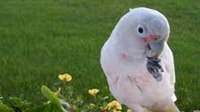Thinking about getting an exotic bird? A local expert offers insight, tips on care

Photograph by Marlene Butkiewicz
A cockatoo isn't a 'typical' pet by most standards; a lot of things tend to set them apart from what folks are used to, like dietary needs, enrichment requirements, housing, hands-on care, interaction/bonding - it takes a lot of commitment of time and your life in general. Aside from the basic care information and knowledge that Marlene shared with me, I was anxious to sit down with her a couple of weeks ago and ask her more, as she is so knowledgeable and passionnate. The latter is so important when considering the prospect of sharing your life with a pet like Buddy, and that certainly describes her owner - in fact having that sort of passion is a starting point on that journey. Pets are not accoutrements, and when their lifespan can range far past the time that you'll be around for them (40 years plus in the case of Goffins, who are in the same order as parrots), a lot needs to be taken into consideration: do I have the sort of lifestyle, time and support system to properly care for this animal? Who will care for them when/if I'm gone?
Enrichment toys, such as empty cardboard boxes are necessary to keep Cockatoos busy and happy. Buddy likes to rip off bits of cardboard and toss it to the bottom of her large cage. Like many animals, Cockatoos are very detail oriented, highly intelligent and like to play games, of sorts. Offer Buddy a plastic puzzley-type toy that's made for birds like her and she'll manipulate it with her beak and feet, and roll it over her back and play with it. Interaction with these birds - like all pets - is crucial to their psychological well being. They like to be where you are, no doubt about it. When I'm caring for Buddy, she likes to sit on my shoulder and interact, allowing me to stroke the back of her neck while she nuzzles me. She'll peer out the window next to where her cage is located and observe wild birds and geese outside, and she loves the morning light - proper natural light is essential.
Cockatoos love water, too. In fact, Buddy enjoys showers. A gentle water spray (again, with filtered, pure water) mimics the rain showers that Cockatoos would experience in the rain forest, and is beneficial is it removes a white powder (dander) that accumulates over time and keeps her feathers in great shape and her health in check. Buddy perches in the shower enclosure (after everything is clean and free from body care product residue to reduce exposure to anything that might harm her), and splashes around under the sprayer.
A special diet is needed to keep her healthy. Rich in fresh, organic (a must) fruit and veggies, her daily grub also consists of a pellet food, some nuts and dried pasta. Marlene stresses the importance of organic food and water should come from a good water filtration system (city water and water softeners should be avoided, as the minerals and salts can be harmful to birds).
A proper housing structure is integral to providing Buddy ample space to stretch and move, places to stage feeding and water containers and secure locks on the doors to keep the creature contained so that she doesn't get into trouble. Goffins are escape artists! The home set up so that Buddy can join the family in the common area of the house (while she is supervised, of course). It's important to consider so many aspects of the home to ensure a her safety as exotic birds are quite honestly, fragile creatures. Environment is everything! There's a sense of balance in the wild that needs to exist in the home as well. Goffins like to chew wood - even furniture - as an example, so that was something that the family needed to think about. Marlene emphasizes that things like scented candles can affect birds, so one needs to be careful with regard to cleaning supplies, air freshener, body care products, that sort of thing. (I don't wear any hair products or body spray/perfume when caring for birds; they can be affected by them.) When I am caring for Buddy, my first rule is to wash my hands before and after handling her and cleaning her cage (gloves are used when cleaning the cage). I can bring in things that are not good for her, and take things out. I abide by the "Happy Birthday Rule".
With a lot of consideration with regard to an exotic birds health and psychological wellness, a routine that fits a bird's needs can be established and enable them to live a healthy, long life - avoiding many of the problems that come with a pet like this in captivity, like self-mutilation (plucking out feathers), nutritional and socially/behaviorally based problems. Read more here to help you decide if this path is right for you.
Lorrie Shaw is a pet blogger, a regular contributor to AnnArbor.com and owner of Professional Pet Sitting, and has extensive experience with animals including dogs, cats, amphibians and of course, birds. Contact her via e-mail.

